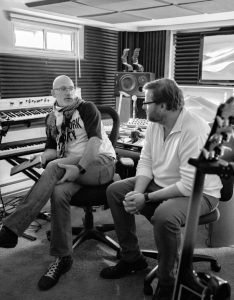Solitude may be an art, but sitting day in and day out in a room writing music can become depressing for an artist. Martin Roy suffered from exhaustion as he was completing the soundtrack for the seventh, and final, season of the Québec television series La Promesse in 2012. “I was also experiencing touring fatigue,” says the bass player, who was often seen playing behind the likes of singers Jean Leloup, Ingrid St-Pierre, and Daniel Bélanger, and who’s one of Dumas’ most faithful collaborators. “I needed a change of pace, a renewal.”
 At about that time, his old guitarist friend Luc Sicard happened to be experiencing the same type of professional and existential angst. After spending more than 20 years in a dark studio writing television, film, and advertising music, he was looking for a way to do things differently.
At about that time, his old guitarist friend Luc Sicard happened to be experiencing the same type of professional and existential angst. After spending more than 20 years in a dark studio writing television, film, and advertising music, he was looking for a way to do things differently.
“What was getting to us were those long hours of working by ourselves, and of having to look after everything. We thought, ‘Why couldn’t we share the load?’” says the veteran composer in his partner’s basement studio, in Montréal’s Rosemont neighborhood. So a partnership that began for personal reasons soon proved to be a boost for the duo’s professional output. “For me, on my own, two series at the same was too much,” says Sicard. “But, together, we can handle three of them all at once.”
Since 2015, the pair has scored the TV programs and series Marche à l’ombre (winner of a 2018 Gémeaux Award), Karl & Max, L’Heure bleue, Le Monstre, La Faille, and Victor Lessard (winner of a Gémeaux Award for Best Original Music for Fiction in September of 2019).
Pretty prolific guys, you say? Well, who were the two tough, hooded stuntmen who appeared fhttps://www.socanmagazine.ca/news/seven-socan-composerswhoscore-win-awards-at-2019-gemeaux/rom nowhere in a back alley to teach a lesson to Jo Barbeau (Antoine Pilon) in Marche à l’ombre? You got it: they were Roy and Sicard! They thought that the (fictional) beating that they were able to give Barbeau on that occasion, at Francis Leclerc’s invitation, was such great fun that they’ve been calling themselves “The Hooded Ones” ever since.
“You can only get a good series if you give free rein to creators.” – Martin Roy
In the studio, the partners allow themselves to be brutally frank with each other. No masks are tolerated. “It’s like in Star Trek, permission to speak freely,” says Roy, while absent-mindedly strumming his splendid Hofner electric bass. “Between the two of us, ego never is a barrier.”
By far the pair’s more talkative half, Sicard gets excited when dsicussing the open dialogue that takes place between the two of them. There’s lots of it because, contrary to other scoring teams, they both work on each and every series or film cue (instead of dividing the scenes between themselves beforehand).
“Martin shares his ideas with me, I share mine with him, and we take it from there,” says Sicard. “We collide with each other, we look at it every which way, and we don’t get hurt. On the contrary, we get stimulated! When you’re 25, and starting in the business, you’re not able to go there, you’re still fragile, but us, we have the advantage of having grown up. If Martin tells me, ‘This is a shitty idea,’ we just trash it, and find other ideas five minutes later! I’m not about to try to convince him that it’s a good idea. We have no time to waste on that kind of stuff! Anyway, we can’t be worrying that we’re going to let a good idea slip through our fingers: ideas are a-dime-a-dozen!”
No resource is more renewable than ideas. But for them to blossom, those who produce them need some wiggle room. This principle is under attack, now that traditional television is losing ground, and that major distributors are yielding to panic.
“A fear syndrome is developing,” Roy was sad to say. “An author can write a super scenario, and it’s going to be completely watered down, because people on high are wondering if ‘the average viewer’ will be able to understand it. Radio-Canada is not calling us directly, but we can sense this fear that starts from the top, and trickles all the way down to us. When you’re writing TV music, you’ve got to like what you’re watching. You’re not showing them a playlist, but investing a piece of yourself, a piece of your heart, a piece of your soul. Broadcasters don’t realize this, but they stifle the product by creating that fear. You can only get a good series if you give free rein to creators.”